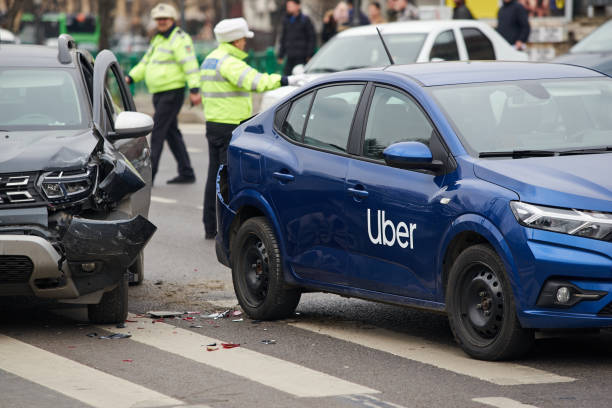South Windsor Rideshare Accident Lawyer
Do you need a South Windsor rideshare accident lawyer? If you or a loved one has been involved in an accident with an Uber, Lyft, or rideshare driver—whether as a passenger, another driver, or even a pedestrian—you have rights. Understanding these rights and navigating the complexities of rideshare accident claims requires the help of an experienced attorney. At Etemi Law, we are dedicated to helping victims of rideshare accidents receive the compensation they deserve.
Call us today at (203) 409-8424 for a


The Reality of Rideshare Accidents
Uber and Lyft have revolutionized transportation, providing millions of rides daily across the U.S. However, with the rise of these services, the number of rideshare-related accidents has also increased. Research from Rice University and the University of Chicago suggests that ridesharing services have contributed to a 2-3% increase in U.S. traffic fatalities since 2011, leading to up to 1,100 deaths annually.
Common Causes of Rideshare Accidents
Uber and Lyft drivers often operate under challenging conditions, increasing their risk of accidents. Some of the most common causes include:
- Distracted Driving – Relying on GPS, accepting ride requests, and managing passengers can divert a driver’s attention.
- Driver Fatigue – Many rideshare drivers work long hours or multiple jobs, leading to drowsy driving.
- Unfamiliar Routes – Navigating new areas can cause sudden stops or erratic driving behavior.
- Poor Vehicle Maintenance – Rideshare drivers are responsible for keeping their vehicles in good working condition, but lapses can lead to preventable accidents.
Connecticut Rideshare Laws and Regulations
Connecticut has strict laws governing rideshare companies and their drivers. These include:
- Mandatory Background Checks – Uber and Lyft must conduct background checks on all drivers, including a criminal record and driving history review.
- Vehicle Safety Requirements – Vehicles must pass inspections and meet specific safety criteria.
- Insurance Coverage – Rideshare companies must provide at least $1 million in liability coverage when drivers are transporting passengers.
- Driver Hour Limits – Uber and Lyft drivers can work a maximum of 14 consecutive hours and 16 hours in a 24-hour period to prevent fatigue-related accidents.
Who is Liable in a Rideshare Accident?
Determining liability in an Uber or Lyft accident can be complex, as multiple insurance policies may be involved. Our legal team at Etemi Law will investigate your case to establish liability and maximize your compensation.
If Another Driver is At Fault
- The at-fault driver’s insurance is the first line of compensation.
- If the at-fault driver is uninsured or underinsured, Uber/Lyft’s uninsured motorist coverage may apply.
If the Rideshare Driver is At Fault
- If the driver was logged into the app and waiting for a ride request, Uber/Lyft provides $50,000 per person/$100,000 per accident in bodily injury coverage.
- If the driver was transporting a passenger, Uber/Lyft provides $1 million in liability coverage.
- If the driver was off duty, their personal auto insurance applies.
Why You Need a South Windsor Uber and Lyft Accident Lawyer
Rideshare accident cases involve multiple insurance companies and complicated liability issues. Insurance companies often try to minimize payouts, but with an experienced attorney from Etemi Law, you can fight for the full compensation you deserve.
Our legal team will: ✅ Investigate the accident thoroughly ✅ Obtain key evidence, including rideshare records and driver logs ✅ Negotiate aggressively with insurance companies ✅ Take your case to court if necessary
Contact Etemi Law Today
If you or a loved one has been injured in an Uber or Lyft accident, don’t wait. Protect your rights and get the compensation you deserve. Contact Etemi Law today for a free consultation.
📞 Call us at (203) 409-8424 💻 Visit us online to schedule your case review
As winter moves in, South Windsor’s slippery margins become a real factor in shared rides. On stretches of Route 5 the early morning black ice and wet leaf slick can surprise both drivers and passengers, turning routine pickups into abrupt loss-of-control incidents. I look at patterns—diminished sightlines at dawn, sudden braking when a rideshare vehicle meets packed slush—and how those dynamics affect immediate care choices and crash investigations.
Crashes involving rideshare cars in South Windsor frequently show a spectrum of injuries: whiplash, concussions, broken bones and soft‑tissue trauma from low‑speed impacts near neighborhood curbs and parking lots. Route 30’s business corridors and commuter entrances often concentrate short, multi-stop trips where sudden maneuvers lead to spine and shoulder complaints that may not surface until hours or days later — complicating when and how riders seek medical attention.
When injuries are more severe, weather delays in South Windsor push critical transport timelines. Ambulances weaving through icy side streets can take longer to reach major centers, and that often means transfers to Hartford Hospital for trauma evaluation become a part of the care chain. I’ve observed patterns where emergency stabilization locally is followed by an interfacility move to a downtown trauma center for imaging, surgery, or specialized rehab planning once roads clear.
The Scantic River corridor and nearby low-lying lots in South Windsor create microclimates where black ice forms overnight and afternoon thaw leaves treacherous patches at curbside pick-ups. For rideshare riders and drivers that means delayed ambulance response, longer waits for interfacility transfer, and a rehabilitation pathway that often starts with local outpatient clinics before progressing to specialized services at regional trauma centers. My reporting focuses on these practical timelines so the community understands risks, common recovery patterns and logistical hurdles after a winter crash.
